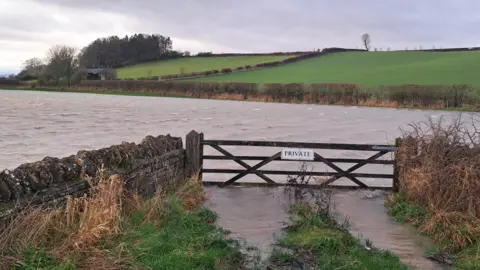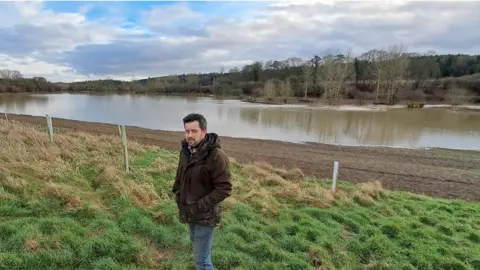Storm Henk-hit farmers call for stronger river defences
 Neady Peady / BBC Weather Watchers
Neady Peady / BBC Weather WatchersFlood-hit farmers are calling on the government to invest more in river defences in rural areas to protect UK food production.
Thousands of acres of crops and productive farmland are now sitting under floodwater left by Storm Henk.
The NFU says farmers who are expected to let fields of crops flood to protect towns should also be compensated.
A government spokesperson said £221m was being spent on maintaining flood defences in 2023/24.
Persistent wet weather over the Christmas period and New Year has caused further damage to farms that had already been hit by Storms Babet and Ciaran in the autumn.
 Ollie Stobo
Ollie StoboThird-generation tenant farmer Ollie Stobo, 45, who farms cereal crops on 500 acres of land near Witney in Oxfordshire, has been hit by floodwaters for the seventh time in two years.
Two fields - a tenth of the farm - are currently underwater after the River Evenlode flooded this week.
One field had already been too wet to drill and plant the normal winter crop after the autumn's heavy rainfall; the second had stubble turnips planted, which a neighbour's sheep grazed.
"The sheep down there were marooned and we had to get then out fairly quickly because the river levels were coming up so quickly.
"I can jetski now from one end of the farm to the other at the moment!" Mr Stobo told the BBC.
Some local farmers in the area are members of the North East Cotswolds Farming Cluster, which brings together almost 140 farms, covering 42,000 hectares, to work on landscape-scale environmental schemes.
That includes turning fields into wetland habitats designed to take the River Evenlode's flood waters and prevent flooding in Oxford itself.
But Mr Stobo is determined not to give up productive land and to continue growing crops despite the continual threat of extreme weather.
"We take a gamble planting winter crops because when we do put wheat down there it is a stonking crop.
"I'm a tenant and the land is very fertile and I can't afford not to grow anything on it. We're farmers and we are here to grow food," he said.
'Financial stress'
Many farmers hit by the storms are attending the Oxford Farming Conference on Thursday, where Environment Secretary Steve Barclay announced improvements to the government's post-Brexit farming payment scheme, known as Environmental Land Management Schemes (Elms), which replaced EU subsidies.
His announcement included a pledge to use food labelling to make it clearer when imported products do not meet UK welfare standards so consumers can choose to buy British and support farmers.
After the announcement, Mr Barclay told the BBC that the government was also helping farmers by investing in flood defences, saying: "The work that the government has done has protected over half a million acres of farmland and, of course, we are committing more money to future schemes as well - over £5bn of investment in 2,000 schemes that the government has committed to over a six-year period from 2021."
But the NFU deputy president, Tom Bradshaw, said farmers currently facing "the huge financial stress and misery" that flooding brings also needed more immediate direct help.
The NFU believes the way funding for flood defences is currently allocated leaves farmers and rural communities at a higher risk than urban communities.
Mr Bradshaw told the BBC: "This constant wet weather again highlights the need for government to recognise the strategic importance of domestic food production and urgently deliver solutions to mitigate the impact of flooding of farmland to ensure our farmers and growers can continue producing food for the nation."
A spokesperson for the Department of Environment, Food and Rural Affairs (Defra) said the government was "acutely aware of the impact extreme weather can have on the farming community".
She added that since 2015 more than 850 flood defence projects had been completed, protecting homes, infrastructure and more than 700,000 acres of agricultural land while £25m had been allocated to a new natural flood management scheme.
